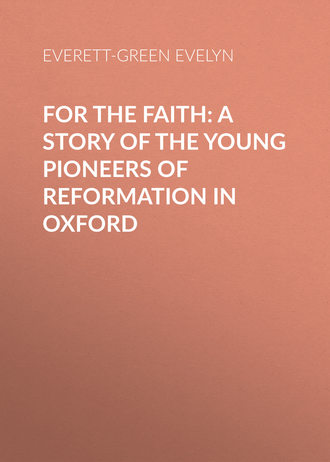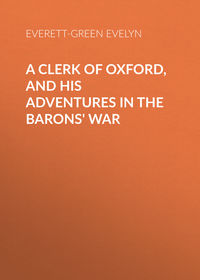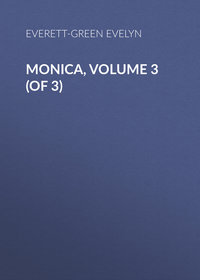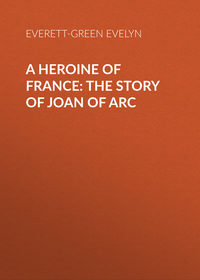 полная версия
полная версияFor the Faith: A Story of the Young Pioneers of Reformation in Oxford
And now he had taken a new and forward step. Suddenly he seemed to have been launched upon a tide with which hitherto he had only dallied and played. He was pushing out his bark into deeper waters, and already felt as though the cables binding him to the shores of safety and ease were completely parted.
It was in part due to the magnetic personality of Garret that this thing had come to pass. When Dalaber left Oxford it was with no idea that it would be a crisis in his life. He wished, out of curiosity, to be present at the strange ceremony to be enacted in St. Paul's Churchyard; and the knowledge that Clarke was going to London for a week on some private business gave the finishing touch to his resolution.
But it was not until he sat with Thomas Garret in his dark lodgings, hearing the rush of the river beneath him, looking into the fiery eyes of the priest, and hearing the fiery words which fell from his lips, that Dalaber thoroughly understood to what he had pledged himself when first he had uttered the fateful words, "I will be a member of the Association of Christian Brothers."
True, Clarke had, on their way to town, spoken to him of a little community, pledged to seek to distribute the life-giving Word of God to those who were hungering for it, and to help each in his measure to let the light, now shrouded beneath a mass of observances which had lost their original meaning to the unlettered people, shine out in its primitive brilliance and purity; but Dalaber had only partially understood the significance of all this.
Clarke was the man of thought and devotion. His words uplifted the hearts of his hearers into heavenly places, and seemed to create a new and quickened spirituality within them. Garret was the man of action. He was the true son of Luther. He loved to attack, to upheave, to overthrow. Where Clarke spoke gently and lovingly of the church, as their holy mother, whom they must love and cherish, and seek to plead with as sons, that she might cleanse herself from the defilement into which she had fallen, Garret attacked her as the harlot, the false bride, the scarlet woman seated upon the scarlet beast, and called down upon her and it alike the vials of the wrath of Almighty God.
And the soul of Dalaber was stirred within him as he listened to story after story, all illustrative of the corruption which had crept within the fold of the church, and which was making even holy things abhorrent to the hearts of men. He listened, and his heart was hot as he heard; he caught the fire of Garret's enthusiasm, and would then and there have cast adrift from his former life, thrown over Oxford and his studies there-and flung himself heart and soul into the movement now at work in the great, throbbing city, where, for the first time, he found himself.
But when he spoke words such as these Garret smiled and shook his head, though his eyes lighted with pleasure.
"Nay, my son; be not so hot and hasty. Seest thou not that in this place our work for the time being is well-nigh stopped?
"Not for long," he added quickly, whilst the spark flew from his eyes-"not for long, mind you, ye proud prelates and cardinal. The fire you have lighted shall blaze in a fashion ye think not of. The Word of God is a consuming fire. The sword of the Spirit, the Word of God, pierces the heart and reins of man; and that sword hath been wrested from the scabbard in which it has rusted so long, and the shining of its fiery blade shall soon he seen of all men.
"No," added the priest, after a moment's pause to recover himself and take up the thread of his discourse; "what was done at Paul's Cross yesterday was but a check upon our work. The last convoy of books has been burnt-all, save the few which we were able to save and to bide beneath the cellar floor. The people have been cowed for a moment, but it will not last. As soon seek to quench a fire by pouring wax and oil upon it!"
"You will get more books, then? The work will not cease?"
"It will not cease. More books will come. Our brave Stillyard men will not long be daunted. But we must act with care. For a time we must remain quiet. We may not be reckless with the holy books, which cost much in money and in blood-or may do, if we are rash or careless. But nothing now can stop their entrance into a land where men begin to desire earnestly to read them for themselves. Not all, mind you. It is strange how careless and apathetic are the gentry of the land-they that one would have thought to be most eager, most forward. They stand aloof; and the richer of the trades' guilds will have little to say to us. But amongst the poor and unlettered do we find the light working; and in them are our chiefest allies, our most earnest disciples."
"Yet we have many at Oxford, learned men and scholars, who would gladly welcome changes and reforms in the church; and there are many amongst the students eager after knowledge, and who long to peruse the writings of Luther and Melancthon, and see these new versions of the Scriptures."
"Ay, I know it. I was of Oxford myself. It is but a few years that I left my lodging in Magdalen College. I love the place yet. The leaven was working then. I know that it has worked more and more. Our good friends Clarke and Sumner have told as much. Is not your presence here a proof of it? Oh, there will be a work-a mighty work-to do in Oxford yet; and you shall be one of those who shall be foremost in it."
"I?" cried Dalaber, and his eyes glowed with the intensity of his enthusiasm. "Would that I could think it!"
"It shall be so," answered Garret. "I read it in your face, I hear it in your voice. The thought of peril and disgrace would not daunt you. You would be faithful-even unto death. Is it not so?"
"I would! – I will!" cried Dalaber, stretching out his hand and grasping that of Garret. "Only tell me wherein I can serve, and I will not fail you."
"I cannot tell you yet, save in general terms; but the day will come when you shall know. Oxford must have books. There will soon be no doubt as to that. And when we have books to scatter and distribute there, we want trusty men to receive and hide them, and sell or give them with secrecy and dispatch. It is a task of no small peril. Thou must understand that well, my son. It may bring thee into sore straits-even to a fiery death. Thou must count the cost ere thou dost pass thy word."
"I care nothing for the cost!" cried Dalaber, throwing back his head. "What other men have done and dared I will do and dare. I will be faithful-faithful unto death."
"I shall remember," answered Garret, with a smile upon his thin ascetic face-"I shall remember; and the day will come-a day not far distant, as I hope-when I shall come to thee and remind thee of this promise."
"I shall not have forgotten," spoke Dalaber, holding out his hand; "whenever the Brotherhood calls upon me it will find me ready."
There was silence for a while, and then Dalaber looked up and asked:
"What of Clarke, and Sumner, and others there? Will they not help also in the good work?"
"Yes; but in a different fashion," answered Garret. "It is not given to all to serve alike. Those men who dwell within college walls, overlooked by dean and warden, waited on by servants in college livery, bound by certain oaths, and hemmed about by many restrictions, cannot act as those can do who, like yourself, are members of the university, but dwellers in small halls, and under no such restraints. Clarke has done great service, and will do more, by his teachings and preachings, which prepare the hearts of men to receive the good seed, and awaken yearnings after a deeper, purer, spiritual life than that which we see around us in those who should be the bright and shining lights of the day. That is their work, and right well do they perform their tasks. But to such as you belongs the other and arduous labour of receiving and distributing the forbidden books. When the time comes, wilt thou, Anthony Dalaber, be ready?"
"I will," spoke the youth in earnest tones; and it was plain that he spoke in all sincerity.
The position of students living in colleges and living in halls, as they were called, was, as Garret had said, altogether different. Graduates and undergraduates of the colleges which had sprung up were fenced about with rules and restrictions which have been modified rather than changed with the flight of time. But the hall of olden Oxford was merely a sort of lodging house, generally kept by a graduate or master, but not subject to any of the rules which were binding upon those students who entered upon one of the foundations. Indeed, the growth of colleges had been due in great part to the desire on the part of far-seeing men and friends of order as well as learning to curb the absolute and undesirable freedom of the mass of students brought together at Oxford and Cambridge, and in the middle ages living almost without discipline or control, often indulging in open riots or acts of wholesale insubordination.
Anthony Dalaber was not at present a member of any college, nor even of one of the religious houses where students could lodge, and where they lived beneath a sort of lesser control. He and Hugh Fitzjames, both of them youths of limited means, shared a lodging in a house called St. Alban Hall, and were free to come and go as they pleased, none asking them wherefore or whither. He saw at once that what would not be possible to a canon of Cardinal College would be feasible enough to him and his friend, if Fitzjames should sympathize with him in the matter. And, so far, he believed his friend was with him, though without, perhaps, the same eager enthusiasm.
When the visit to Garret came to an end, and Anthony Dalaber said farewell to him at the water side, where a barge was to convey them some distance up the river, the priest held his hands long and earnestly, looking into his eyes with affectionate intensity, and at the last he kissed him upon both cheeks and said: "God be with thee, my young brother! May He keep thee firm and steadfast to the last, whatever may befall!"
"I am very sure He will," answered Dalaber fervently. "I am yours, and for the good cause, for life or death."
They parted then, and the voyage began; but little was spoken by the travellers so long as they remained in the barge. Clarke seemed to be thinking deeply, his eyes fixed earnestly upon Dalaber's face from time to time; whilst the latter sat gazing behind him at the city, sinking slowly away out of his sight, his eyes filled with the light of a great and zealous purpose.
They left the water side in the afternoon, and walked towards a certain village, and Clarke, turning towards his companion, said:
"I have promised to preach this evening in a certain house yonder. I trow there will be no peril to me or to those who hear me. But of that no man can be certain. What wilt thou do? Come with me, or walk onwards and let us meet on the morrow?"
Dalaber hesitated no single moment; Clarke's preaching was one of his keenest delights. And upon this evening he was moved beyond his wont as the young master spoke from his heart to his listeners, not striving to arouse their passions against tyranny or bigotry, but rather seeking to urge them to patience, to that brotherly love which endures all things and hopes all things, and turns to the Almighty Father in never-ceasing faith and joy, imploring His help to open the eyes of the blind, soften the hearts that are puffed up, and cleanse the church, which must be made pure and holy as the bride of Christ, for that heavenly marriage supper for which her spouse is waiting.
Nothing was spoken which the orthodox could well complain of; yet every listener knew that such a discourse would not have been preached by any man not "tainted" with what was then called heresy. But the hearts of the hearers burnt within them as they listened; and when, after some further time spent in discussion and prayer, the preacher and his companion found themselves alone for the night in a comfortable bed chamber, Dalaber threw himself upon Clarke's neck in an outburst of fervid enthusiasm.
"Oh, let me be ever your son and scholar," he cried, "for with you are the words of life and light!"
Then the elder man looked at him with a great tenderness in his eyes, but his voice was full of gravity and warning.
"Dalaber," he said, "you desire you know not what. And I fear sometimes that you seek to take upon yourself more than you wot of-more than you are able. My preaching is sweet unto you now, for that no persecution is laid upon you. But the time will come-of that I am well assured, and that period peradventure shortly-when, if ye continue to live godly therein, God will lay upon you the cross of persecution, to try whether you, as pure gold, can abide the fire."
"I know it! I am ready!" cried Dalaber, with the characteristic backward motion of his head. His face was like the face of a young eagle. He was quivering from head to foot.
Clarke looked at him again with his fatherly smile, but there was trouble also in his eyes.
"Be not over confident, my son; and seek not to take upon you more than you are able to bear."
Dalaber understood instantly to what Clarke was alluding.
"I trust I have not done so. But men will be wanted. I am a Christian Brother. I must not shrink. My word is passed. Not to you, my master, alone, but to Master Garret also."
"To whom I did make you known," spoke Clarke, with a very slight sigh. "My son, I would not speak one word to discourage your godly zeal; but bethink you what this may mean. You shall (it may be) be judged and called a heretic; you shall be abhorred of the world; your own friends and kinsfolk shall forsake you; you shall be cast into prison, and none shall dare to help you; you shall be accused before bishops, to your reproach and shame, to the great sorrow of all your friends and kindred. Then will ye wish ye had never known this doctrine; then (it may be) ye will curse Clarke, and wish you had never known him, because he hath brought you into all these troubles."
But Dalaber could bear that word no longer; he flung himself at the feet of his master, and the tears broke from his eyes.
"Nay, nay, speak not so, I beseech you; you cut me to the heart! I boast not of myself as being wiser or braver or more steadfast than other men; I only pray of you to try me. Send me not away. Let me be pupil, and scholar, and son. I cannot turn back, even if I would. My heart is in the good work. Let me follow in the path I have chosen. I have put my hand to the plough; how can I turn back?"
Clarke looked down upon the youth with a world of tender love in his eyes, and raising him up in his arms he kissed him, the tears standing on his own cheeks.
"The Lord God Almighty give you grace and steadfastness now and ever," he said in a deep voice, full of feeling, "and from henceforth and ever take me for your father in Christ, and I will take you for my son!"
So the compact was sealed between the two; and when on the morrow they took their way towards Oxford, the heart of Anthony Dalaber was joyful within him, for he felt as though he had set his foot upon the narrow path which leads to life everlasting, and he reeked little of the thorns and briers which might beset the way, confident that he would be given grace to overcome.
He was happier still when he was able to obtain the exclusive companionship of Freda Langton in the sunny garden of the Bridge House, and pour into her willing ears all the story of his visit and its wonderful consequences. To Anthony Dalaber some sympathetic confidante was almost a necessity of existence; and who so well able to understand him as the girl he loved with every fibre of his being, and who had almost promised him an answering love? There was no peril to her in knowing these things. The day for making rigorous inquisition in all directions had not yet come, and there was no danger to himself in entrusting his safety to one as true and stanch as this maiden.
Freda's sympathies from the outset had been with those independent thinkers, who were in increasing peril of being branded as heretics; and she listened with absorbing interest to the story of the hidden books, the little band of Christian Brothers, the work going on beneath their auspices, and the check temporarily put upon it by the holocaust of books which Dalaber had witnessed at St. Paul's.
"And you saw it-you saw them burn the books! You saw the great cardinal sitting on his throne and watching! O Anthony, tell me, what was he like?"
"His face I could not well see, I was too far away; but he walked with stately mien, and his following was like that of royalty itself. Such kingly pomp I have never witnessed before."
"And our Lord came meek and lowly, riding upon an ass, and had not where to lay His head," breathed Freda softly. "Ah, ofttimes do I wonder what He must think of all this, looking down from heaven, where He sits expecting, till His enemies be made His footstool. I wonder what yonder pageant looked like to Him-a prelate coming in His place (as doubtless the cardinal would think) to judge those whose crime has been the spreading abroad of the living Word, and now watching the burning of countless books which contain that living Word, and which might have brought joy and gladness to so many. When I think of these things I could weep for these proud men, who never weep for themselves. I can better understand the words of Master Clarke when he says, 'Plead with your mother-plead with her.'"
"We will plead. We have pleaded already; we will plead again and yet again!" cried Dalaber, with a flash in his dark eyes. "But methinks a time will come when the day of pleading will be past, and the day of reckoning will come; and she will have to learn that her children will not always suffer her impurities and abominations, but that they will rise up and cleanse the sanctuary from the filthiness wherewith it is defiled."
"Yet let them not cease to love her," spoke Freda gently, "for, as Master Clarke truly says, we are all one body-the Body of Christ; and if we have to war one with another, and rend that body for its own healing, we must yet remember that we are all members one of another even in our strife."
"It is a hard saying," spoke Dalaber, "yet I believe it is the truth. God send us more men like John Clarke, to show us the way through this tangle of perplexities!"
Chapter IV: "Merrie May Day."
"You will come and hear us sing our 'merrie katches' from the tower, sweet ladies. They should sound sweetly this year, more sweetly than ever, for we have improved in our methods, and our boys have been better taught since Master Radley of Cardinal College has given us his help; and he will come and sing with us, and he hath a voice like a silver bell."
The speaker was Arthur Cole, a student of Magdalen College, who was now a frequent visitor at the Bridge House. He was a young man of good family and prospects, nearly related to one of the proctors of the university. He had a good presence, an elegant figure, and was master of many favourite sports and pastimes. He kept horses and dogs and falcons, and had several servants lodging in the town to look after these creatures, and to attend him when he sallied forth in search of sport. Moreover, he had recently introduced into Oxford the Italian game of "calcio" (of which more anon), and was one of the most popular and important men of his college. He was always dressed with great care and elegance, although he was no fop; and he was so handsome and so merry withal that all who knew him regarded him with favour, and his friendship was regarded as a sort of passport to the best circle of university life.
Freda and Magdalen answered his appeal with smiling glances. They were holding one of their little mimic courts in the garden by the river. Their father had been reading and discoursing with sundry students, who came to him for instruction more individual and particular than could be given in the schools in the earlier part of the day; and the young men before leaving always sought to gain speech with the two fair sisters, who were generally at this hour to be found in the garden.
Arthur Cole, Anthony Dalaber, and Hugh Fitzjames, their cousin, had lingered to the last, and now were talking of the joustings and merry makings of the approaching May Day, which was ushered in by the melodious concert from the summit of Magdalen College tower.
In olden days this was not a sacred selection of hymns, but madrigals, roundelays, and "merrie katches," as the old chroniclers term them, sung by the boys maintained for the musical part of the daily service, and by such singing men or musically inclined students as were willing and able to help. Anthony Dalaber, who possessed an excellent voice, which he often employed in the service of Cardinal College Chapel, had been invited to assist this year; and a new singing man from that college, Stephen Radley by name, was considered a great acquisition.
This man had not long been in Oxford, and had been sent by the cardinal himself on account of his remarkable voice. He did not live in the college itself, but in a lodging near at hand, and equally near to Magdalen College. Arthur Cole, foremost to discover talent and appreciate it, and attracted by the fine presence and muscular development of the singer, had struck up a friendship with him, and Dalaber had followed his example in this.
"Radley will lead off the madrigal to springtide and love," he cried, "which erstwhile has been spoiled for lack of a voice that can be heard alone from such a height. I trow it will ring through the soft air like a silver trumpet. You will be there to hear?" and his eyes dwelt upon the face of Freda, whilst those of Arthur rested more particularly upon that of Magdalen.
"Ah, yes, we shall certainly be there," they both answered; and Freda added gaily, "Albeit ye begin the day somewhat early. But why should we not be up with the sun on Merrie May Day?"
"Why not, indeed?" questioned Arthur eagerly, "for the day will scarce be long enough for all there is to do. You will come to the sports in the meadows later, fair maidens? And I have a favour to ask of you twain. May I be bold enough to proffer it now?"
They looked at him with smiling, questioning eyes.
"A favour, fair sir?"
"Yes, truly; for I would ask of you to be witness to our contest of calcio in yonder green meadow, and to present to the victors the garlands of laurel and flowers which are to be their reward who shall come off triumphant in the strife. No contest is so keenly contested as that which is watched by the bright eyes of fair ladies, and I would ask that ye be the queens of the strife, and reward the victorious company with your own fair hands."
The girls assented gladly and gaily. They had heard much of this newly-introduced game, and were curious to witness it. The more ancient sports of quintain, on land and water, morris dancing, quarterstaff, archery, and such like, were all familiar enough. But calcio was something of a novelty; and to be chosen as the queens of the contest was no small pleasure, and their eyes beamed with gratification and delight.
Arthur Cole was equally pleased at having won their consent, and told them how that a fine pavilion would be erected in the meadow, where they and their friends could survey the scene at ease, protected alike from the heat of the sun, or from falling showers, should any betide. It was plain that this spectacle was to be on a decidedly magnificent scale. Arthur Cole was said to have expended much money upon the rich dresses of the players; now he spoke of a pavilion for the selected bystanders. It promised to be quite a fresh excitement for the university.
Dalaber and Cole went away together slightly later, and Hugh Fitzjames remained to supper with his kinsfolks.
"Anthony has taken a mighty liking for yonder fine gentleman of late," remarked the youth. "They are ever together now. Well, he might do worse for a friend. Master Cole is one of the richest students in Oxford."
"That is not what attracts Anthony, though," spoke Freda. "I think it has been this new game, into which Anthony has thrown himself with such zest. Perhaps it is good for him to have other things than his books to think of. A short while back he was ever poring over the written page and burning the midnight oil. You said so yourself, Hugh."
"Yes, verily; and I have no quarrel with him for it. I think he is safer playing calcio with Cole than for ever studying the books he gets from Clarke and his friends, as he has been doing of late."









